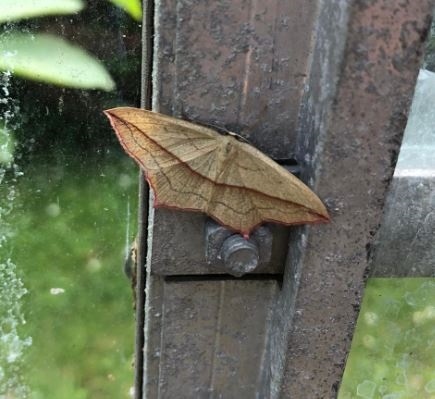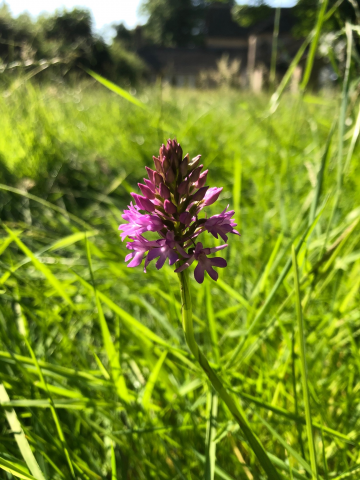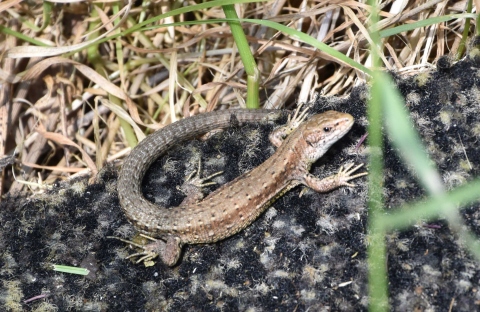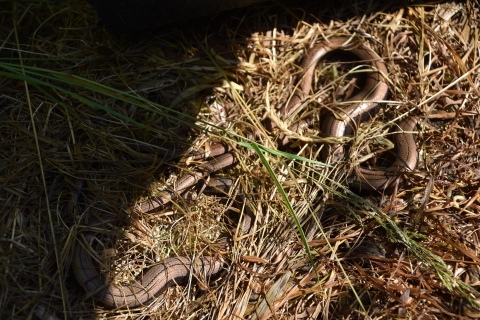Wild Campus Cirencester
Connecting with Wildlife
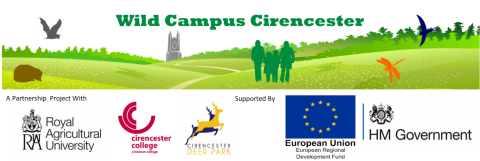
Developing wildlife habitats across Cirencester's education quarter to connect wildlife populations, benefit protected species and invest in our community, environment, wellbeing and prosperity.
Wild Campus Cirencester is a European Regional Development Fund funded project, established in 2020 as a partnership between the Royal Agricultural University, Cirencester College and Cirencester Deer Park School.
The viability of wildlife depends on the corridors of natural habitat that species travel along to forage, breed and migrate with seasonal changes. These are becoming increasingly scarce across the UK and as a result the wildlife that supports the pollination of our crops, the control of pests and our general wellbeing is vanishing.
The Wild Campus Cirencester project seeks to bring about real change at a local level, engaging and educating university students, school pupils, staff at the three organisations and the local community in Cirencester.
The collaborative initiative focuses on 144 acres of land occupied by the three educational establishments, which equates to approximately half the size of the town of Cirencester itself. It aims to make transformational changes to the area, developing habitats that connect wildlife populations, including rare bat species, birds, butterflies, bees, dragonflies, amphibians and reptiles.
Read more in the Wild Campus blog
|
Blood vein moth, taken by Liam Collins |
Pyramidal orchid, taken by Ruth Rudwick |
|
Common lizard, taken by Bec Elton |
Two female slow worms, taken by Bec Elton |
How are we going to achieve this and what can you do to get involved?
It’s not about turning our sports pitches over to weeds, but about integrating the natural world into our campus life. It’s about rehabilitating the land, achieving new and improved habitats, greater plant and animal diversity and maximising connectivity for the wildlife in our region. It’s also about connecting us to the surrounding countryside so we can continue to enjoy the birds and hedgehogs that keep pests under control in our own gardens and provide us with the pleasure, relaxation and education opportunities that we have come to recognise as being so important.
During 2021 and 2022, we will be sowing the seeds for a sustainable and brighter future for our campus wildlife and future generations in Cirencester. We will be working with our young people, university students, academics, professional services staff, local community and conservation groups to establish diverse natural grasslands for butterflies and bee populations and dark travel corridors and roosting locations for foraging bats. Additional pond habitats will be created for amphibians and other invertebrates and woodland, hedgerows and shrub cover will be planted to provide food and cover for birds and mammals.
At the same time our grounds staff will be learning, alongside students, how to continue to manage and care for these habitats so they are sustainable and can contribute to our local economy. There will be opportunities for everyone to get involved with special educational events, talks and practical work. Collaborations with local businesses are also being explored; a glass of locally sourced camomile gin or a pot of lavender honey really brings wildlife that little bit closer to our daily lives.
By 2023 we will:
- Diversify 4ha of lawn
- Plant 1km² of native shrubs
- Seed 3km² of wild flowers
- Create dark corridors to connect bat populations and increase foraging opportunities
- Install 150 bird and bat boxes
Hedgehog friendly campus
In 2022, the Royal Agricultural University (RAU) signed up to become a Hedgehog Friendly Campus (HFC). This is a project funded by the British Hedgehog Preservation Society and started in 2018 in response to the rapidly declining hedgehog population. Hedgehogs are listed as vulnerable to extinction on Britain’s Red List due to habitat loss, developing land and other anthropogenic hazards (e.g. garden maintenance). Hedgehog Friendly Campus aims to protect hedgehogs from hazards, enhance habitats and raise awareness within the community.
As a part of Wild Campus Cirencester, the RAU installed 5 hedgehog shelters around the campus, and has aspired to improve the existing habitats on campus. HFC is divided into four sections, bronze, silver, gold and platinum; with each level requiring a certain number of tasks to be completed. In January 2023 we were proud to be awarded with our bronze award. The tasks required for this award covered a wide range of activities, and therefore we were able to include a wide range of both students and staff. One of the most exciting parts of this award was to conduct hedgehog surveys, this was done by both students and staff using ink tunnels and thermal imaging spotters which were kindly supplied by Infiray UK. These proved excellent methods for surveying as it allowed for us to gain an understanding of the general population on campus without being invasive.
We have been continually raising money for the British Hedgehog Preservation Society. This has included collection points around campus as well as a Just Giving Page. However, our main event was the RAU’s Hedgehog Friendly Campus’ launch which was ran by conservation students Rebecca Smith and Angharad Webb. This was an excellent event which included a successful cake sale and multiple speakers to educate attendees on their work with hedgehogs and generally raising awareness. Most of the other tasks completed were done with the help of the Conservation Club. They have worked tirelessly to complete hazard and pond audits, build hedgehogs houses and bug hotels and complete copious amounts of litter picks (20 bags in total). In fact, we won an award for the strangest piece of litter found, which was a fridge! A key part of this award is to inspire others to become hedgehog heroes. To do this, we visited schools in the local area to teach about our Wild Campus Project as well as Hedgehog Friendly Campus. We completed a range of activities including how to rescue an injured hedgehog, invertebrate hunting and wildlife identification through the use of our camera trap footage.
Find out more
Our project management team, including students and volunteers are leading this exciting project, but it’s very much an initiative that relies on the engagement and enthusiasm of our students and school pupils, supported by the wider community.
You can find out more about Wild Campus Cirencester by following our social media: @wildcampusciren on Instagram, @wildcampusciren on Twitter and our page on Facebook, Wild Campus Cirencester. You can also email wild.campus@rau.ac.uk.
